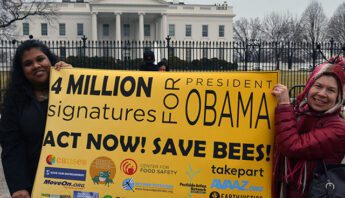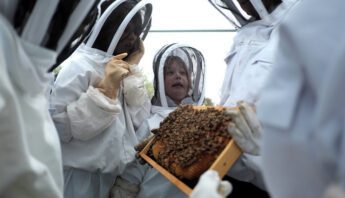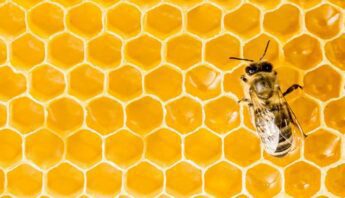FOR IMMEDIATE RELEASE: May 19, 2015
Contact: Lex Horan, lex@panna.org, 651.245.1733
 Nearly a year after President Obama announced the creation of a federal task force to tackle the alarming decline of honey bees and other pollinators, today the White House released its strategy to address the issue.
Nearly a year after President Obama announced the creation of a federal task force to tackle the alarming decline of honey bees and other pollinators, today the White House released its strategy to address the issue.
While the Pollinator Health Task Force sets an ambitious target for reducing honey bee declines (to an annual average of 15% overwintering loss), it offers few clear commitments to restrict or reduce the use of neonicotinoids and other bee-harming pesticides. The plan emphasizes increasing habitat for pollinators through state pollinator protection plans.
Lex Horan, spokesperson for Pesticide Action Network, said the following:
“The federal strategy announced today is a far cry from the ‘all hands on deck’ approach President Obama had promised to the public last year. The Administration set ambitious goals to stem bee declines, but without more meaningful action to restrict neonicotinoids and other bee-harming pesticides, it’s hard to imagine how the Task Force will make good on its promises. The plan’s shortcomings are alarming given recent reports that last year’s bee losses were the second-worst on record for U.S. beekeepers.
When it comes to pesticides, President Obama and other federal decisionmakers have passed the buck. Instead of taking responsibility for protecting bees nationwide, today’s recommendations call for state and tribal governments to create pollinator plans. These state plans center on notifications from pesticide applicators to beekeepers, placing an unfair burden on beekeepers to try to protect their bees when pesticides are applied nearby, and failing to protect wild bees and other pollinators that cannot be relocated when pesticides are applied.
The Task Force has made a few moves to limit pollinator exposure to harmful pesticides, like prohibiting the use of certain pesticides in areas where managed honey bees are known to be foraging, and speeding up EPA’s review of neonicotinoids. This is a good start, but our nation’s pollinators need more. A lopsided federal policy that takes decisive action on habitat, mites, and other issues, while remaining stuck on pesticides, will not turn the tide on bee declines.”
###







